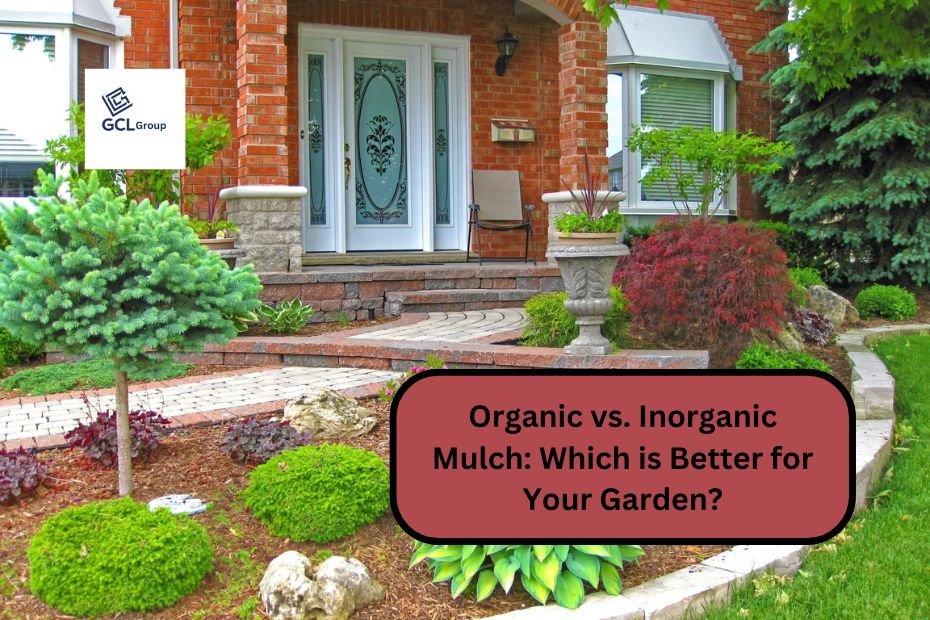Mulching is one of the simplest and most effective ways to maintain a healthy garden. Whether you are planting vegetables, flowers, or trees, mulch can improve soil quality, conserve moisture, and reduce the number of weeds. But when it comes to choosing the right mulch for your garden, there is often a debate between organic and inorganic options. In this article, we will explore the key differences between organic and inorganic mulch, the pros and cons of each type, and how to determine which one is better for your garden.
What is Mulch?
Before diving into the debate of organic versus inorganic mulch, it’s essential to understand what mulch is and why it’s important. Mulch is any material placed on the soil surface to protect it from environmental factors. It acts as a barrier, retaining moisture, suppressing weeds, and regulating soil temperature.
Mulch can be made from a variety of materials, broadly classified into two types:
- Organic Mulch: Includes materials that were once living, such as leaves, grass clippings, straw, compost, and wood chips.
- Inorganic Mulch: Includes non-living materials like plastic sheeting, landscape fabric, gravel, and rubber.
Each type offers unique benefits and drawbacks, making it important to choose the right one depending on your gardening goals.
Organic Mulch
1. What is Organic Mulch?
Organic mulch is made from natural materials that decompose over time. Common examples of organic mulch include wood chips, straw, leaves, grass clippings, pine needles, and compost. These materials provide an extra layer of nutrients to the soil as they break down, enhancing soil health.
2. Benefits of Organic Mulch
- Improves Soil Health: As organic mulch breaks down, it enriches the soil with nutrients, improving soil structure and promoting healthy root development.
- Enhances Soil Fertility: Organic mulches like compost can supply essential nutrients like nitrogen, phosphorus, and potassium, improving the fertility of your garden soil.
- Increases Microbial Activity: The decomposition of organic materials promotes the growth of beneficial microorganisms, such as earthworms and bacteria, that help break down organic matter into nutrients that plants can use.
- Retains Moisture: Organic mulch helps prevent moisture loss from the soil, which is especially helpful in dry climates or during hot summer months.
- Reduces Erosion: A layer of organic mulch can help reduce soil erosion by protecting the top layer of soil from wind and rain.
- Regulates Temperature: Organic mulch acts as insulation for the soil, keeping it cooler in summer and warmer in winter, which helps protect plant roots.
3. Drawbacks of Organic Mulch
- Decomposition Requires Maintenance: Since organic mulch breaks down over time, it needs to be replaced regularly to maintain its effectiveness.
- Potential Pest Issues: Some organic mulches, especially wood chips and straw, can attract pests like termites, ants, and rodents if not properly managed.
- Weed Growth: While organic mulch can suppress weeds, certain materials like straw or grass clippings may contain weed seeds that could spread to your garden.
- Odor and Appearance: Some types of organic mulch, particularly compost or manure, may have an unpleasant odor. Additionally, organic mulch may lose its aesthetic appeal as it decomposes.
Inorganic Mulch
1. What is Inorganic Mulch?
Inorganic mulch is made from synthetic or natural non-living materials that do not break down over time. Examples include plastic sheeting, rubber mulch, gravel, and landscape fabric. These materials provide long-lasting ground cover without the need for frequent replacement.
2. Benefits of Inorganic Mulch
- Long-Lasting: Inorganic mulch does not decompose, which means it requires less frequent replacement compared to organic mulch. This can save time and effort for gardeners looking for low-maintenance solutions.
- Effective Weed Control: Inorganic mulches like landscape fabric or plastic sheeting create a barrier that prevents weeds from emerging. They are highly effective in weed suppression, especially in vegetable gardens or areas with high weed pressure.
- Prevents Soil Compaction: Inorganic materials like gravel or rubber mulch can help reduce soil compaction, allowing water to penetrate the soil more easily.
- No Attraction for Pests: Unlike organic mulch, inorganic mulch does not attract insects or rodents since it doesn’t provide a food source for them.
- Aesthetic Appeal: Inorganic mulches like gravel and rubber can be used as decorative elements in landscaping, adding texture and color to garden beds.
3. Drawbacks of Inorganic Mulch
- No Nutrient Benefits: Unlike organic mulch, inorganic materials do not break down and contribute nutrients to the soil. They only serve as ground cover and do not improve soil health.
- Expensive Initial Cost: Inorganic mulch, such as rubber or landscape fabric, can be more expensive upfront compared to organic mulch.
- Can Overheat Soil: Some inorganic mulches, especially black plastic or rubber, can absorb and retain heat, causing the soil to become too hot for certain plants, particularly in warm climates.
- Water Runoff Issues: Inorganic mulch, particularly plastic sheeting, can prevent water from properly penetrating the soil, leading to water runoff and poor soil moisture retention.
- Environmental Concerns: Many inorganic mulches, especially plastic or rubber, are not biodegradable and may contribute to environmental pollution over time.
Comparing Organic and Inorganic Mulch
1. Soil Health and Fertility
Organic mulch contributes directly to soil health by adding nutrients as it decomposes. Over time, it improves soil structure, increases water retention, and enhances microbial activity. In contrast, inorganic mulch does not provide any nutritional benefits to the soil and merely serves as a protective layer.
2. Longevity and Maintenance
Inorganic mulch is more durable and long-lasting since it doesn’t decompose, making it a low-maintenance option. Organic mulch, on the other hand, needs to be replenished regularly as it breaks down, which can be labor-intensive.
3. Weed Suppression
Both organic and inorganic mulches suppress weeds to varying degrees. However, inorganic options like landscape fabric and plastic sheeting offer more effective and long-term weed control. Organic mulches can also suppress weeds, but they may not be as effective in areas with heavy weed pressure.
4. Cost and Accessibility
Organic mulch is often more affordable and readily available, especially if you can source materials like leaves, grass clippings, or wood chips from your yard. Inorganic mulch, such as gravel or rubber, tends to be more expensive upfront but may save money in the long run due to its durability.
5. Environmental Impact
Organic mulch is environmentally friendly since it is biodegradable and enhances the natural ecosystem. Inorganic mulch, particularly plastic and rubber, may contribute to environmental pollution if not disposed of properly. Additionally, some inorganic mulches are made from recycled materials, which can be a more eco-conscious choice.
Choosing the Right Mulch for Your Garden
The choice between organic and inorganic mulch depends on your specific gardening needs and goals. Here are a few factors to consider:
- Soil Health: If you want to improve soil quality and fertility, organic mulch is the best option. It adds essential nutrients to the soil as it decomposes and promotes healthy root growth.
- Weed Control: If your primary goal is to suppress weeds, inorganic mulch such as landscape fabric or plastic sheeting may provide better results.
- Climate and Temperature: In warm climates, organic mulch is preferable because it helps regulate soil temperature and retains moisture. In contrast, inorganic mulch may overheat the soil, particularly in the summer months.
- Aesthetic Preferences: If appearance is important to you, both organic and inorganic mulches offer various options. Inorganic mulch, such as gravel or rubber, can add a decorative element to your garden, while organic options like wood chips or pine needles create a more natural look.
- Environmental Concerns: If you are environmentally conscious, organic mulch is the better choice since it is biodegradable and improves the ecosystem.
Conclusion
Ultimately, the choice between organic and inorganic mulch depends on your gardening goals, budget, and environmental considerations. Organic mulch is ideal for improving soil health, retaining moisture, and supporting the natural ecosystem. It requires more maintenance, as it needs to be replenished regularly, but its long-term benefits for soil health make it a worthwhile investment. On the other hand, inorganic mulch provides excellent weed suppression, requires less maintenance, and offers aesthetic appeal but lacks the ability to enhance soil fertility. By understanding the pros and cons of each type, you can make an informed decision about which mulch will work best for your garden.
| Home | Click Here |
| Category | Click Here |

